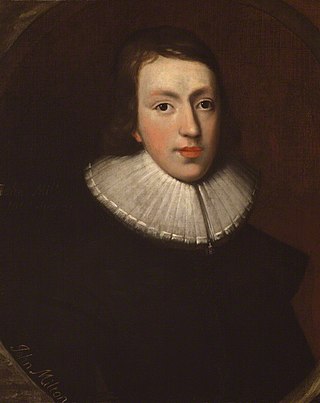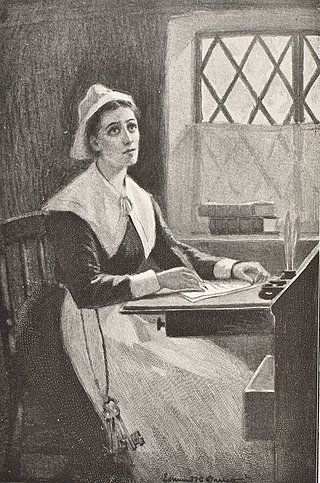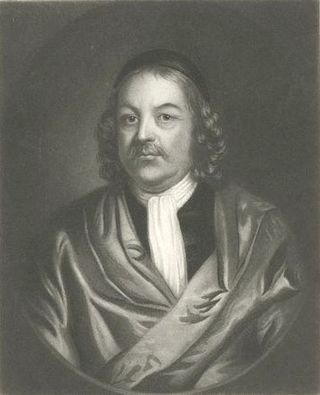
John Milton was an English poet and intellectual. His 1667 epic poem Paradise Lost, written in blank verse and including over ten chapters, was written in a time of immense religious flux and political upheaval. It addressed the fall of man, including the temptation of Adam and Eve by the fallen angel Satan and God's expulsion of them from the Garden of Eden. Paradise Lost elevated Milton's reputation as one of history's greatest poets. He also served as a civil servant for the Commonwealth of England under its Council of State and later under Oliver Cromwell.

John Dryden was an English poet, literary critic, translator, and playwright who in 1668 was appointed England's first Poet Laureate.

This article focuses on poetry from the United Kingdom written in the English language. The article does not cover poetry from other countries where the English language is spoken, including Republican Ireland after December 1922.

Sir William Davenant, also spelled D'Avenant, was an English poet and playwright. Along with Thomas Killigrew, Davenant was one of the rare figures in English Renaissance theatre whose career spanned both the Caroline and Restoration eras and who was active both before and after the English Civil War and during the Interregnum.
This article contains information about the literary events and publications of 1674.
This article contains information about the literary events and publications of 1667.

The term Metaphysical poets was coined by the critic Samuel Johnson to describe a loose group of 17th-century English poets whose work was characterised by the inventive use of conceits, and by a greater emphasis on the spoken rather than lyrical quality of their verse. These poets were not formally affiliated and few were highly regarded until 20th century attention established their importance.

Anne Bradstreet was the most prominent of early English poets of North America and first writer in England's North American colonies to be published. She is the first Puritan figure in American Literature and notable for her large corpus of poetry, as well as personal writings published posthumously.
Edward Taylor was a colonial American poet, pastor and physician of English origin. His work remained unpublished for some 200 years but since then has established him as one of the foremost writers of his time. His poetry has been characterized as "American Baroque" as well as Metaphysical.

Simon Bradstreet was an New England merchant, politician and colonial administrator who served as the last governor of the Massachusetts Bay Colony. Arriving in Massachusetts on the Winthrop Fleet in 1630, Bradstreet was almost constantly involved in the politics of the colony but became its governor only in 1679.

Restoration literature is the English literature written during the historical period commonly referred to as the English Restoration (1649-1659), which corresponds to the last years of Stuart reign in England, Scotland, Wales, and Ireland. In general, the term is used to denote roughly homogenous styles of literature that centre on a celebration of or reaction to the restored court of Charles II. It is a literature that includes extremes, for it encompasses both Paradise Lost and the Earl of Rochester's Sodom, the high-spirited sexual comedy of The Country Wife and the moral wisdom of The Pilgrim's Progress. It saw Locke's Treatises of Government, the founding of the Royal Society, the experiments and holy meditations of Robert Boyle, the hysterical attacks on theatres from Jeremy Collier, and the pioneering of literary criticism from John Dryden and John Dennis. The period witnessed news becoming a commodity, the essay developing into a periodical art form, and the beginnings of textual criticism.

Anne Killigrew (1660–1685) was an English poet and painter, described by contemporaries as "A Grace for beauty, and a Muse for wit." Born in London, she and her family were active in literary and court circles. Killigrew's poems were circulated in manuscript and collected and published posthumously in 1686 after she died from smallpox at age 25. They have been reprinted several times by modern scholars, most recently and thoroughly by Margaret J. M. Ezell.

Arbella or Arabella was the flagship of the Winthrop Fleet on which Governor John Winthrop, other members of the Company, and Puritan emigrants transported themselves and the Charter of the Massachusetts Bay Company from England to Salem between April 8 and June 12, 1630, thereby giving legal birth to the Commonwealth of Massachusetts. John Winthrop is reputed to have given the famous "A Model of Christian Charity" sermon aboard the ship. Also on board was Anne Bradstreet, the first European female poet to be published from the New World, and her family.
Nationality words link to articles with information on the nation's poetry or literature.
Events from the 1630s in England.
The reception history of John Milton and his works has been a mixture of positive and negative responses, with his greatest influence being found within his poetry.
Nationality words link to articles with information on the nation's poetry or literature.
Benjamin Tompson was an American Puritan poet, author, educator and physician from the Massachusetts Bay Colony, who is widely considered by historians as the "first native-born poet in America". He is also noted for his poems and writings involving King Philip's War and related conflicts between the colonies and Massachusett Indian Nations in 17th-century southern Massachusetts. In the aftermath of Indian attacks and the burning of entire towns and churches, Tompson saw this as an occasion to memorialize the tragic loses incurred in the conflicts through poetry and other writings in the hopes that it would also inspire other writers who were generally silent to take up the cause. His poem, Harvardine Quils, is the definitive example, directed at Harvard's scholars and other writers.









